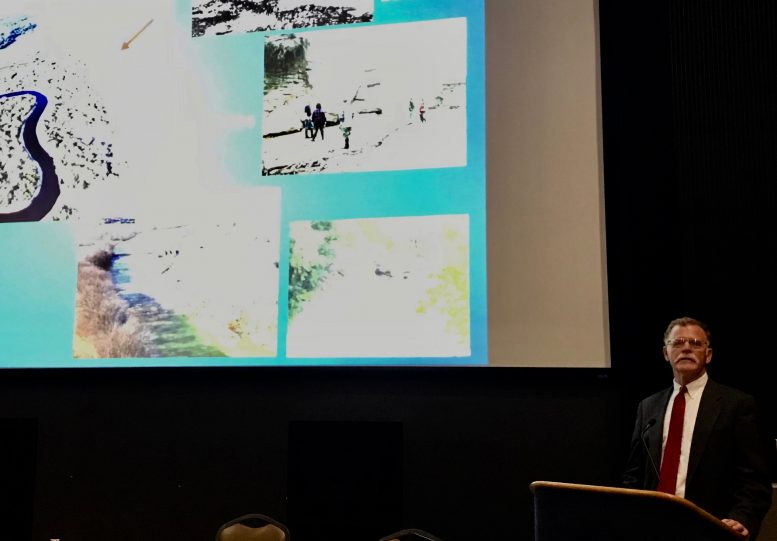By DAVID DUPONT
BG Independent News
As a professor of geology, Jim Evans has one foot in the distant past and one foot in the future.
He studies sediments in ancient riverbeds that are thousands of years old, and teaches the geologists of the future.
Evans retired at the end of the spring semester after a 32-year teaching career at Bowling Green State University. He’ll still be on campus for another year as he shepherds four graduate students to complete their masters degree work.
His work has real world implications. When he delivered a valedictory lecture last April his focus was on how dams have reshaped the natural environment to suit the needs of humans. Now some of those dams are in critical condition.
Evans, who serves on the Ohio Dam Safety Organization, has concerns about the state of many of the state’s dams including Buckeye Lake south of Columbus. If it failed thousands of homes would be flooded as would Interstate 70.
In his lecture he spoke of his love of old documents, prints, and history.
Evans grew up in Cleveland. He loved nature and was uncertain whether he’d major in biology or geology when he headed west to study at Carleton College in Minnesota. He wasn’t good at dissection, he said. Then at Carleton he took a freshman seminar in geology. It had no lectures, just field work.
Evans’ path was set. It led to the University of Minnesota in Minneapolis and then for doctoral work to the University of Washington in Seattle.
Evans already realized that he wanted to teach, and his dissertation advisor Jody Bourgeois “exploited” that desire. Whenever she had to be away she assigned Evans to teach his courses, often graduate classes. That, Evans said, was the hardest because he was teaching his peers.
Evans was hired right out of graduate school to teach at BGSU, but he detoured first to Washington, D.C. Before he could join the faculty he learned that he had received a legislative fellowship to serve in the office of then U.S. Rep. Mike Lowry of Washington State.
Lowry, Evans noted, was one of the most liberal members of Congress. Yet some of those the Democrat worked most closely with were conservative Republicans. “That’s the kind of collaboration that is needed now,” Evans said.
He remained engaged in public policy throughout his career, including teaching a course on the topic.
“For politicians,” Evans said, “scientists are often seen as scolds. They give opinions on what’s right and wrong but can’t deliver either votes or money.”
The public has similarly mixed feelings about scientists. They “gripe about scientists living in ivory towers,” he said, but “they do listen when they talk and hold them in high esteem.”
He added: “We’re sort of targets of internet trolls.”
Over the years Evans has published 60 scholarly papers and edited two books.
He’s also been outspoken on campus whether about a proposal in the state legislature to loosen laws allowing guns on campus, the removal of native trees, or the misuse of student evaluations to review faculty.
He’s been active in unionization. He became committed to the need for the faculty to organize when changes in the administration seemed to him to threaten faculty rights.
He has served on the negotiating team. “Though some feel unionization has made relations more legalistic,” he said. “It is important to maintaining faculty’s role in the university and protecting such basic rights as tenure.”
A former chair of Faculty Senate, he said he once knew where everything was in the university charter. Now in the wake of the charter’s revision following unionization, he’s lost that mastery. “I haven’t kept up.”
Evans said he wishes that BGSU had a doctoral program. That would allow for extended contact with graduate students. Now with students seeking their masters degrees, he feels like he gets them trained and they’re gone.
As with all faculty in geology, Evans also teaches introductory courses. Most of these students are simply taking the course at fulfill a general education requirement. Most are already majoring in or planning to major in something other than geology. Evans reassures them: “I’m not here to convert you.”
Instead he helps them see how what they are learning in geology can be applied to other disciplines. And occasionally there will be a student who does decide to pursue geology.
“I’m perfectly happy teaching the introductory classes,” he said.
He will no longer do field work. At 65, climbing mountains and going in and out of river beds is too physically rigorous.
Evans lives in Bowling Green with his wife, Penny Evans Meyer. They have two grown daughters, Heidi and Emily.
Evans said he has no plans for retirement. “I haven’t looked too far down the road.”

